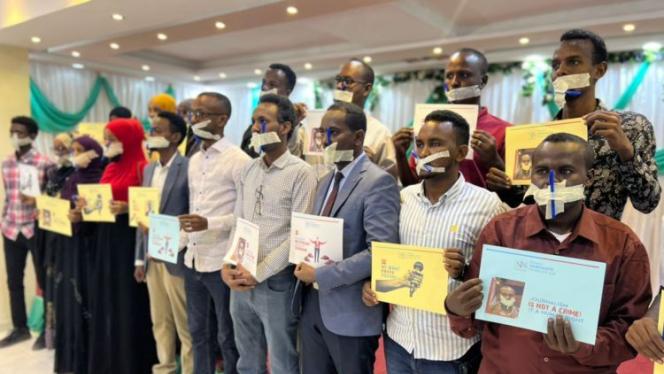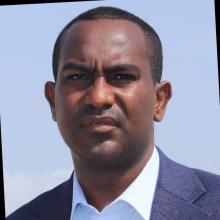Thursday 21 November 2024
In Somalia and Somaliland press freedom remains a casualty

Abdalle Ahmed Mumin, secretary general of the Somali Journalists Syndicate, says more needs to be done to protect journalists and their freedom to report
Media freedom has once again become a casualty amid the recent conflict between Somalia and Somaliland, following the memorandum of understanding (MoU) inked between Hargeisa and Addis Ababa. Journalists operating within both regions have faced egregious intimidation, arbitrary detentions, and censorship. The deal at this stage remains so opaque and shrouded in mystery that one western diplomat dubbed it a “memorandum of misunderstanding”.
The detention of three MM TV journalists – Mohamed Abdi Ilig, Mohamed Abdi Abdullahi (Andar), and cameraman Ilyaas Abdinasir – in Hargeisa on February 6, following an online discussion; and the harassment of journalists conducting street interviews in Mogadishu have stifled information reaching the public so that people can critically inquire and scrutinise what this will mean for them.
While both Somalia and Somaliland’s constitutions ostensibly guarantee freedom of expression in practice, this right is persistently violated. Journalists are frequently subjected to threats, imprisonment, closure of media outlets, and tragically, even targeted killings. We mourn the loss of four journalists this year; Abdikarin Ahmed Bulhan, shot dead in Abudwak city, central Somalia, on March 14. Additionally, eleven others have been arbitrarily detained, harassed, and denied access to information across Somaliland, Puntland, Galmudug, and Mogadishu, as documented by the Somali Journalists Syndicate (SJS). Prominent journalist Hussein Abdulle Mohamed, who courageously reported on Somalia’s National Intelligence and Security Agency (NISA), was forcibly disappeared for 24 hours on April 16-17 in Mogadishu. Regrettably, many of these attacks were perpetrated by members of security agencies.
Our organisation, the SJS, has also been targeted. On April 13, our bank accounts were frozen, and three criminal charges were filed by the Somali attorney general in response to our advocacy for press freedom and human rights. One of these charges includes criminal defamation against me. While no explanation has been provided, the attorney general claims to be investigating, the results of which will be submitted to the court. Unfortunately, such persecution is not new to me, as I have endured persistent threats, harassment, and detention in 2022 and 2023. From the outset of my career in journalism 20 years ago, I have remained steadfast in my commitment to truth-telling, combating injustice, and resisting the influence of politicians. It is this steadfastness that has made me and my colleagues a target.
Journalism in Somalia is a perilous profession, with 86 journalists killed since 1992, according to documentation by the Committee to Protect Journalists (CPJ). Tragically, Somalia remains one of the top three countries on CPJ’s Impunity Index, where the killers of journalists often evade justice. Furthermore, lawyers defending journalists are also under threat, with five Somaliland lawyers facing criminal prosecution instigated by the National Intelligence Agency (NIA) through the attorney general's office. These lawyers recently issued a legal recommendation urging the intelligence agency to cease detaining journalists. When journalists and their defenders are targeted, it sends a chilling message to civil society that speaking out is no longer an option – a reality which has become far too commonplace.
The recent announcement by the Somali prime minister's office to appoint nine government officials to the country’s press council, tasked with regulating media, and the suspension in March of Somalia state media journalist Sugaal Moalim Mohamud for criticising army leadership over mismanagement and corruption, are further indicators of autocratic creep: attempts to control, manipulate, and silence journalists. We vehemently oppose these measures and advocate for an independent press council in Somalia.
However, the challenges extend beyond these immediate concerns.
Somalia lacks the will to establish a national human rights commission, which could play a pivotal role in advocating for and protecting human rights, including freedom of expression. In the face of these violations and attacks on journalists, impunity remains a major challenge. When attackers are not held accountable, it erodes public trust in law enforcement and the judiciary, undermining faith in the authorities' ability to protect journalists and uphold the rule of law. Consequently, the absence of the rule of law perpetuates a cycle of violence against journalists, leading many to self-censorship out of fear for their safety or prompting them to leave the country altogether. Many of Somalia’s most prominent journalists report from abroad.
While Somaliland has announced preparations for elections slated for November 13 this year, authorities must recognize that a free and fair election, a vital benchmark for a functioning democracy, necessitates a free, responsible and independent press. The federal government of Somalia and its regional states must also acknowledge this reality. A free press plays a crucial role in informing the public about government actions, policies, and societal issues. Without ensuring the safety of journalists and protecting their freedoms, and without providing access to accurate and diverse information, citizens cannot make informed decisions, which are indispensable for democracy to flourish.







